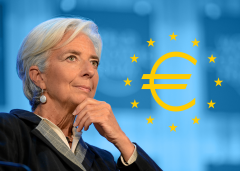Economists, conservative investors, and market observers have been issuing stern warnings for years regarding the severe impact of the current monetary policy direction.

The ECB's Poblems
In a recent statement, European Central Bank (ECB) Vice President Luis de Guindos warned of potential side effects and risks to the economy resulting directly from the central bank's policies. He outlined how a decade of extremely aggressive monetary interventions have resulted in an erosion of financial stability and now pose a threat to the eurozone's economic outlook. While he defended the bank's negative interest rate strategy as "supportive" of the overall economy, he did admit that, because of it, "we also note an increase in risk-taking which could, in the medium term, create financial-stability challenges".
This is a point that was also highlighted in the ECB's latest financial stability review, which found that the ultra-low interest rates have triggered excessive risk-taking, mainly by investment funds, insurers, and in certain real estate markets, thereby creating considerable stability concerns going forward. The report identified four main threats to financial stability for the block: asset mispricing, which sets the stage for a correction, corporate overindebtedness, which raises debt sustainability concerns, dangerously weak banking sector profitability, leading to increased risk-taking, and excessive risks taken in the non-bank financial sector, which could be facing "profitability and solvency challenges."
Although none of this is news to the responsible investor and to the reader who understands monetary history and the inevitable consequences of trying to forcibly twist basic economic laws, it still remains surprising that the ECB would publicly acknowledge it. The timing is even more striking, as the report, outlining the risks associated with the current monetary policy direction, came out very soon after the bank announced its decision to double down on it, cutting rates even lower and launching a new round of quantitative easing (QE).
Lagarde's "Solution"
As the ECB appears to be finally acknowledging the limitations and terrible side effects of its own monetary "cures," and as the eurozone economy continues to struggle, the central planners' focus seems to be shifting to other measures and tools in hopes of a growth revival. Their "solution" is for governments to deploy fiscal measures and to try to stimulate the sluggish euro area economy through spending.
A great example of this "refocusing" was given by Christine Lagarde in late November. In her first major speech since becoming ECB president, she made no substantive comments on or references to the role of the central bank itself, or to an actual policy revision to help support the ailing eurozone economy. Instead, she concentrated on what member states can do and on the part that increased public investment should play going forward. She highlighted that that monetary policy "cannot and should not be the only game in town," and she urged European governments to boost spending. She also argued what the EU needs in order to increase productivity is more integration in various areas including capital markets and the banking sector.
It can be argued that the only saving grace of the eurozone's deeply problematic economic and monetary structure is the fact that at least some of the member states, through the budgetary leeway the system affords, did manage their finances in a comparatively responsible way. Now, it is those states that are in the crosshairs of the ECB, as President Lagarde demonstrated when she singled out "countries with chronic budget surpluses like the Netherlands and Germany" and criticized them for not spending enough. There's a lot of support for this position, as many are eyeing those surpluses as a way out of the economic glut that the bloc is currently in. As French Minister of the Economy and Finance Bruno Le Maire clearly put it in September, "What's the point of having public accounts perfectly in order … if your European neighbors can't benefit from your growth and economic dynamism?"
Of course, the sound investor can immediately see the many dangers that lie in this direction. On top of monetary excesses, the road is now being paved for fiscal ones too. Absurd as it might sound, the central bankers' solution for their concerns of overindebtedness and financial instability — which they've admitted their own policies gave rise to — is to encourage the very few member states with stable budgets to destabilize themselves. At a time like this, when the next recession is around the corner and when the ECB has little to no ammunition left to fight it, it seems clear that the individual states that "kept their powder dry" fiscally would be better positioned to take action against the effects of the slowdown. Criticizing budget discipline and surpluses and promoting spending and further integration is a strategy that is bound to seriously backfire, and one that will only serve to exacerbate the impact of the economic slowdown.
This approach also highlights the institutional myopia at the very top of the eurozone. Having learned nothing from the mistakes of the last recession, the "cures" that are being prescribed for the next one are very likely to come with even worse side effects. It is thus clear that it is up to the individual investor and saver to prepare and to protect their wealth from the risks that lie ahead.
Commenti
Posta un commento